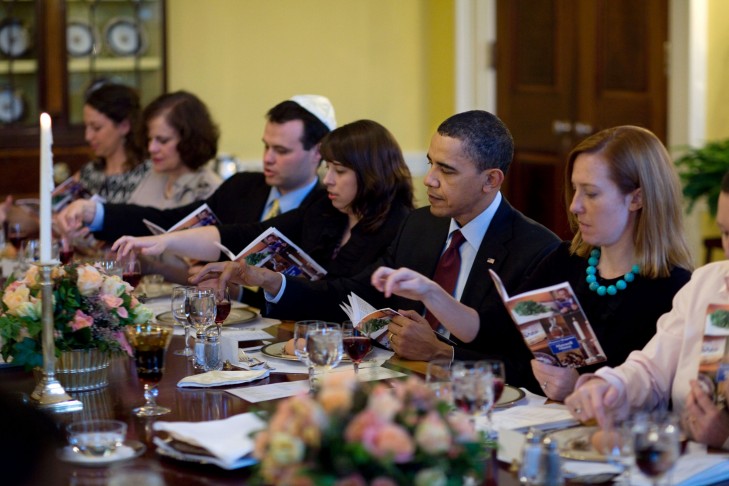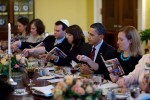In April 2008, Eric Lesser and two of his Jewish colleagues found themselves in Harrisburg, Pennsylvania, on the eve of Passover. Lesser, working as an aide in then-Sen. Barack Obama’s campaign, was part of the candidate’s traveling team. It became apparent that Lesser was not going to make it home to Western Massachusetts for the holiday. There had been a big rally the night before in Philadelphia, and the following day there was a whistle-stop tour to Harrisburg.
The day was long and the time was late by the time Lesser and the others commandeered a small windowless conference room in the basement of the Harrisburg Hilton for a makeshift seder. Lesser’s cousin, then a student at the University of Pennsylvania, put together an “emergency Passover care package” complete with Manischewitz wine and iconic Maxwell House Haggadahs. Candidate Obama stopped in at 10 p.m. that night and celebrated the two-hour seder with Lesser and the others.
Lesser, now a Massachusetts state senator, recently spoke to JewishBoston in anticipation of his appearance at the March 28 celebration of the 10th anniversary of the Obama White House seder, “Why on This Night: Race, Faith and the Obama Seders,” at Temple Israel in Boston. “At that first seder there were no cameras—just close friends and aides,” Lesser recalled. “We went through the entire Haggadah and at the end, when it came time to say, ‘Next year in Jerusalem,’ then-Sen. Obama raised his glass and added, ‘Next year in the White House.’”
A year later, Lesser was working in the West Wing and saw President Obama in the hallway. The president asked if there would be another seder, and in April 2009, the first African-American president hosted the first White House seder in American history. “It was important to summon the spirit of the Harrisburg seder,” said Lesser. “That meant no press, no reporters. It was basically the same group that was with him in Pennsylvania, as well as his wife and daughters. In his eight years in the White House, President Obama never missed a seder.”
- Rabbi Matt Soffer, senior associate rabbi at Temple Israel, told JewishBoston that among the things to celebrate on this anniversary of the White House seder is “the power of the Exodus narrative. This is something that President Obama gave voice to each year when the seder opened. The fact that the president hosted it as a private event in the family’s quarters reflects that this is the story of all stories that we teach to our children.”
The idea to commemorate the anniversary initially came from Temple Israel congregants Mike Offner and Ellen Clegg. Clegg is the former editorial page editor of The Boston Globe, and Offner is compiling an oral history of the White House seder. Soffer said the impetus also “came out of the recognition that, frankly, we’re living through dreadful times. That’s not a controversial statement. The reality is that hatred and hate crimes are on the rise, and we’re not getting the kind of leadership we need from our most powerful public leaders. How will we explain this moment in history to our children in good conscience?”
Robert Trestan, executive director of the Anti-Defamation League’s Boston office, also sees “Why on This Night?” as a nod to Boston’s first black-Jewish seder. Founded by the late Lenny Zakim, ADL Boston’s executive director at the time, the seder was also founded by Bishop John M. Borders III of Morning Star Baptist Church in Roxbury. Borders will also participate in “Why on This Night?”
“Looking back on the occasion of the first White House seder is an opportunity to look at what has happened in Boston over the decades,” said Trestan. “What are the top priorities and issues for black-Jewish relations in our city? How do these two communities work together on mutual interests? The black-Jewish seder is foundational to the Temple Israel program on March 28.”
Added Lesser, “The idea of the first African-American president celebrating the first White House seder in a house built by slaves is the greatest testament to American exceptionalism, to our complex history and, ultimately, to our legacy.”
One thing that distinguished the White House seder from that first one in Harrisburg was concluding the ritual meal with a reading of the Emancipation Proclamation. Lesser observed that it tied together the history of the Jewish people with that of the African-American community.
“The thing I keep coming back to about the seder,” said Soffer, “is the power of memory. In our Jewish tradition, memory is how the past bears upon the present and informs our own mitzvot, or good deeds. Every generation is obliged to see themselves as coming out of Egypt. The text specifically says ‘human being,’ giving rise to the importance of having guests at the seder. Having had a president hosting this Passover ritual in his home is inspiring and significant. We can walk away with light in our hearts, ready for Passover.”
Never miss the best stories and events! Get JewishBoston This Week.




